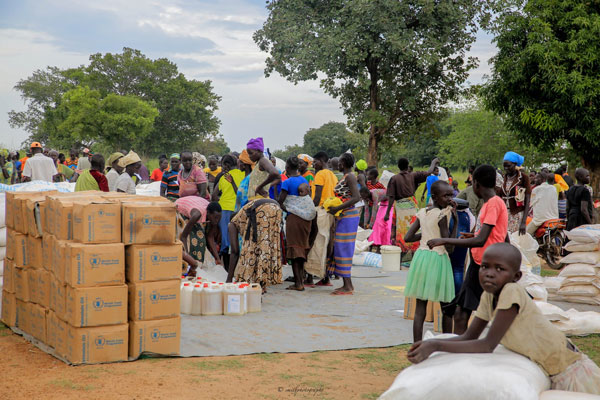
Kampala, Uganda | THE INDEPENDENT | The World Food Program (WFP) has announced upcoming changes to the distribution of food assistance to refugee households based on their vulnerability, starting in July 2023. In a joint press statement released on World Refugee Day 2023, the WFP emphasized the need to prioritize lasting solutions for the global refugee crisis, as sustainable long-term measures remain scarce, leaving millions of forcibly displaced individuals uncertain about their future.
Marcus Prior, WFP Uganda Deputy Country Director, expressed the agency’s commitment to invest in emergency support and long-term resilience projects to enable refugees to not only survive but also thrive. However, limited resources pose a challenge. To address this, collaboration with the Ugandan government is crucial to ensure an inclusive response that caters to the needs of the most vulnerable, including new arrivals, disabled individuals, and the elderly.
Globally, there are over 100 million displaced people, with 35.3 million classified as refugees. Uganda alone hosts 1,535,000 forcibly displaced people, with the majority being South Sudanese refugees. The response to the refugee situation in Uganda faces persistent challenges due to inadequate funding. Key sectors such as health, education, livelihoods, environment, and food and nutrition are significantly affected by the funding shortfall. T
The theme for this year’s World Refugee Day is “Hope Away from Home – A world where refugees are included.” The joint statement emphasizes the importance of inclusiveness, highlighting that refugees, regardless of the duration of their exile, aspire to continue their lives by pursuing education, supporting their families, and building connections within host communities. Through these endeavors, refugees can find the hope they seek.
Eng. Hillary Onek Obaoker, the Minister for Relief, Disaster Preparedness, and Refugee, acknowledged the resilience of refugees and the significance of World Refugee Day in honoring their strength. “It is time to honor their strength and recognize our progressive refugee approaches, ensuring their safety and fostering a supportive environment,” said Eng. Onek.
He added that by addressing the root causes of these conflicts and striving to create conditions for their eventual return home, host countries can truly transform lives and build a more compassionate world. The Government of Uganda, through the Office of the Prime Minister (OPM), will continue to allocate land to newly arrived refugee families in settlements for cultivation purposes, supplementing their monthly food ration provided by the WFP.
The joint statement expressed regret over the resurfacing conflicts that continue to force people to flee their homes in search of safety. Ongoing fighting in Sudan, prolonged unrest in the Democratic Republic of Congo (DRC), and instability in Somalia and South Sudan contribute to the refugee crisis in the East and Horn of Africa and the Great Lakes region, where Uganda is situated.
Uganda, together with France, Niger, Colombia, Jordan, and Japan, will co-convene the Global Refugee Forum in December 2023. This significant international event aims to address refugee issues and promote financial aid, technical knowledge, and policy reforms in line with the objectives of the Global Compact on Refugees (GCR), endorsed by the UN General Assembly in 2018.
“This is an excellent opportunity to assess our achievements in the refugee response, as well as to identify areas of need and challenges where we require additional support,” said Matthew Crentsil, the UNHCR Country Representative. The Global Refugee Forum will serve as a platform for governments to share knowledge and engage in discussions about the commitments necessary to ensure greater sustainability in the refugee response.
Uganda has already initiated activities to assess the refugee situation and prepare for the forum, which will provide an opportunity to evaluate achievements and identify areas that require additional support. While the gradual reduction of food rations over the past three years due to reduced donor funding poses challenges for refugees, these changes are necessary to ensure the effective utilization of available resources.
****
URN
 The Independent Uganda: You get the Truth we Pay the Price
The Independent Uganda: You get the Truth we Pay the Price





